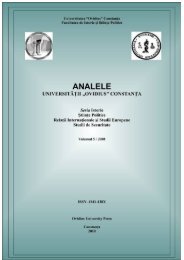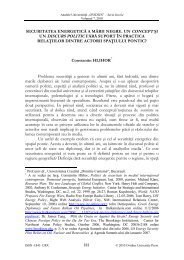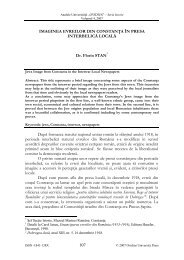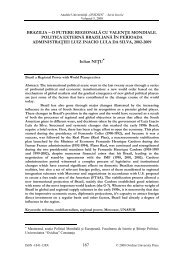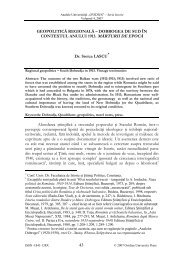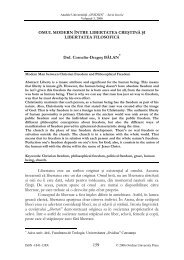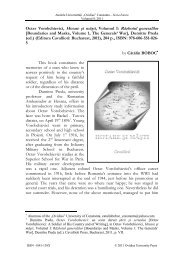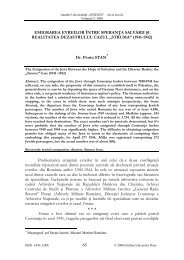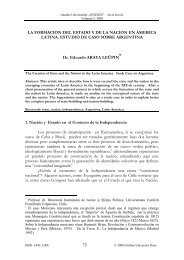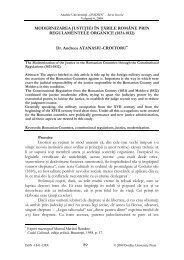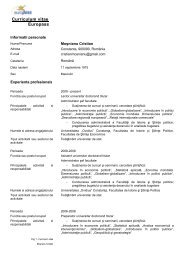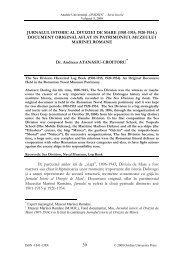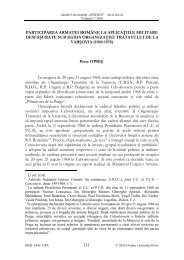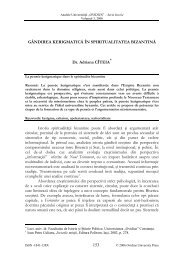analele universitÄÅ£ii âovidiusâ constanÅ£a - AUOCSI
analele universitÄÅ£ii âovidiusâ constanÅ£a - AUOCSI
analele universitÄÅ£ii âovidiusâ constanÅ£a - AUOCSI
You also want an ePaper? Increase the reach of your titles
YUMPU automatically turns print PDFs into web optimized ePapers that Google loves.
Costel Coroban / Analele Universităţii „OVIDIUS” / Vol. 6/ 2009<br />
G. M. Trevelyan, the only good thing he brought was the personal union with<br />
Scotland, 33 while parliamentary, legislative or religious union were still far off, as<br />
the Scots did not forget the humiliations they had to suffer on behalf of their<br />
southern neighbors, 34 who in turn considered them backward and even<br />
barbarian. 35<br />
Scotland now loses the presence of its King, who becomes far richer<br />
and powerful than all the Scots nobles or the Kirk. In an arrogant matter, he is<br />
recorded to have told his English subject that he governs Scotland only by the<br />
stroke of his pen, 36 with the obvious allusion that they should follow example.<br />
Regarding religion, James I pondered on changing the Scots Church<br />
according to the Anglican Church, 37 thus offering the Kirk a new reason of<br />
discontent. 38 In the same forgetfulness, he managed to return to Scotland only<br />
in 1617, which was also his last time there. His son Charles I would also visit<br />
Scotland only once, in 1633, for the event of his coronation at Holyrood Palace,<br />
on which occasion he offended the Presbyterians by allowing himself to be<br />
anointed with holy oil (considered a Catholic superstition). 39<br />
Unlike his father, he did not know Scottish Gaelic or the way of life in<br />
Scotland: poverty, his people’s reliance in their clan, kin and relatives in the<br />
Highlands as well as in the Lowlands, the smallness of towns, which were<br />
considered villages by the English, and the extensive decentralization because of<br />
the natural obstacles and poverty. 40<br />
Although the Scots enjoy a popular image of clansmen warriors clad in<br />
tartan, this icon has little in common with the realities of the early merchants of<br />
the Covenanters in the Lowlands, with the famous philosophers of St. Andrews<br />
history of Britain, concerning both peoples, but he himself understood that the letter was<br />
“touching the Story of England.” (Pauline Croft, “The Reign of James VI and I: the Birth of<br />
Britain,” in History Compass no. 1, 2003, p. 2). Concerning his accession, James I had to<br />
fend off rival claims to the throne, namely the claim of Lady Arbella Stuart (his cousin) and<br />
that of the Spanish Infanta, Isabella. Arbella was unmarried and Isabella did not have any<br />
children, so the English – namely by the Secretary of State Sir Robert Cecil – preferred<br />
James, who already had three children. Upon his crowning he styled his title “King of Great<br />
Britain, France and Ireland, Defender of Faith.” A crucial element he introduced was the<br />
United Kingdom flag (Union Jack), which was flown by the navy (Ibidem, pp. 2-3). Also see<br />
Arthur Williamson, “Scotland and the Rise of Civic Culture, 1550-1650,” in History<br />
Compass vol. 4, no. 1, 2006, pp. 91-123.<br />
32 Rosalind Mitchinson, A History of Scotland, Routledge Publishing, London, 2002, p. 123.<br />
33 G.M.Trevelyan, op. cit., p. 440.<br />
34 Peter & Fiona Sommerset Fry, op. cit., p. 166.<br />
35 G.M.Trevelyan, op. cit., p. 440 and the following.<br />
36 Peter & Fiona Sommerset Fry, op. cit., p. 166.<br />
37 Stoica Lascu, Introducere in Istoria Modernă Universală [Introduction to Universal<br />
Modern History], Constanţa, p. 8.<br />
38 Peter & Fiona Sommerset Fry, op. cit., p. 167.<br />
39 Ibidem, pp. 169-170.<br />
40 Rosalind Mitchinson, op. cit., p. 124-125.<br />
ISSN -1841-138X 212 © 2009 Ovidius University Press



